[INTERVIEW] Mayor Eric Adams Gets Candid About Running The Greatest City In The World
We talked to the mayor of the greatest city in the world. Discussed his challenges, his priorities and a bit of what’s the come. Dive into the Parle New York Mayor Eric Adams interview…
Being mayor of New York City is arguably the hardest job in New York. It’s certainly the most criticized and scrutinized. When New York City Mayor Eric Leroy Adams took office on January 1, 2022, he inherited the city in a post-covid fog. A city still trying to recover from loss of life, loss of learning for our students, loss of opportunity for many workers, and loss of many city staples that had shut down over the course of the pandemic. Mayor Bill de Blasio had left the city in a precarious state and Covid-19 created new norms, but Eric Adams was willing to step in and take up the reins, even if that meant he would never truly be loved or appreciated for his efforts.
I don’t want to gloss over the journey that has been the last 2 years. Eric Adams was not a overwhelming majority favorite candidate. In fact, in a crowded Democratic primary, which featured the first ever ranked choice voting in New York City, Adams came away as the primary winner with about a one percent margin. The final contest against his Republican counterpart would be much easier, but due in part to the fracturing of the Democratic party, the turn out for the mayoral election hit a recent low, garnering only 21% of voters to the poll.
Still, a win is a win.
Listen, I’ll be first to admit that almost 2 full years into his term, things have rocky. Some decisions will forever lead to a side eye—seemingly prioritizing Kyrie Irving and athletes over regular citizens being one of them. However, overall, there have been positives. There have also been a surprising number of unexpected challenges and unprecedented decisions that have needed to be made. Without knowing what other folks would have done, the reality is, we—the city and its residents, can be a lot worse off. Things aren’t perfect, but if we’re being fair, Adams has held his own.
I knew I needed to talk to Mayor Adams because the reality is, many decided to make up their mind about him long ago, some even before he officially took office. We need to give him a longer, deeper look. Just the second African-American mayor in New York City’s history, his story needs to be told, objectively.
Our Mayor Eric Adams interview highlights progress in Education; the migrant crisis and it’s toll on the city, and of course a little bit of the extra-curricular activities that make Adams maybe the most unique Mayor we’ve ever had.
Read on as he tells his side of the story—his fight on the frontlines for the city, in his words. Hopefully this is the first of an ongoing conversation.
ParleNY: Let’s start with this new school year. What do you think about the transition to back-to-school post-pandemic; and what’s happening in education in the city right now?
Mayor Eric Adams: It’s extremely smooth and just this different approach we’re having to education. The Chancellor [David Banks] likes to say, ‘bright start, bold futures’. This is probably one of the most significant steps we’re taking around how do we prepare our children for the future? And that includes so many things: our partnership with the corporate entities so that we can help them design a curriculum that our children will be prepared for, to giving them good starts with our pre-K and early childhood; our dyslexia screening process so that we could identify literacy early, and some of those problems that they’re facing. Healthy environment; we’re going to be teaching children breathing exercises, mindfulness, healthy food…
So I don’t think there’s ever been a time in modern times that we’re looking at a holistic approach to developing the full personhood of our children. Historically, we only focus on academics, but we can’t have academically smart children and not have emotionally intelligent children, and healthy children. Because, you know, as an adult, you know your determination of success depends on how you communicate, how you interact with others, how do you work in groups; your health. If you’re dealing with a health crisis, that impacts your entire life. And so, we are using the moments we have children in school as a full-body approach to all the issues that would make them strong, responsible, intelligent, academically and emotionally, adults.
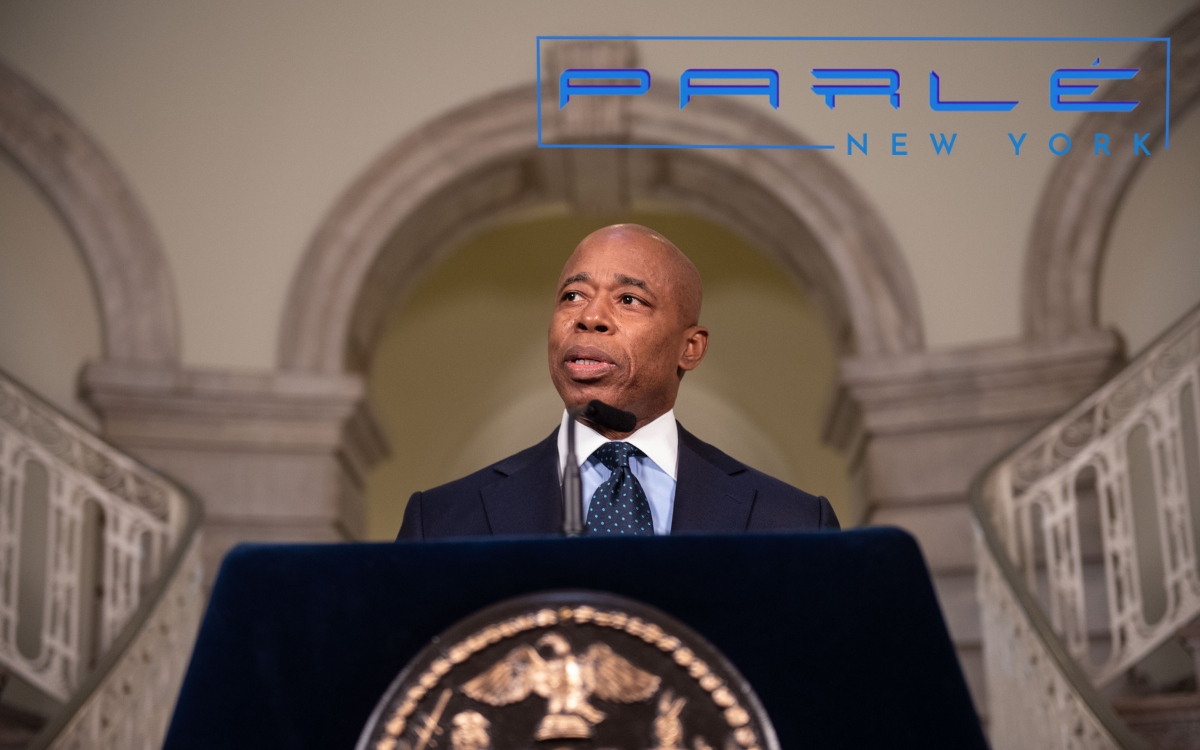
ParleNY: Absenteeism was a big thing last year. I know there’s no data on it so far this year, but do you think that will change this school year? How do you expect it to change?
Mayor Eric Adams: Well, our goal is to really go on the ground and find those children, meet them where they are. That is what Project Pivot is about. That is how we believe we need to get our young people in school. But we also found something else through Covid. That children are learning in different ways. We’re expanding our remote learning. This is huge. The first time in the nation that a school [system] of this size is going to formalize remote learning. Many children—believe it or not—were successful with being at home for whatever reason or another. Some of them were dealing with physical disabilities, some of them just work better in a remote environment, and we’re going to be bold enough to try it and see how it works. So, yes, we’re going to drill down on those children that are historically absent from school to get them back in school, particularly those children who live in public housing and in housing insecure environments. We have to really look at them, because the numbers are clear, if you are housing insecure, you’re less likely to graduate. And you know what, brother? If you’re not educated, you’re going to be incarcerated for the most part, on many levels, and we want to prevent that. And so, the goal is to improve our numbers. The chancellor is very clear on that, and I think we’re going to see some real success.
ParleNY: The migrant crisis—have to talk about that. I know it’s probably the biggest thing you’re dealing with, and probably the biggest thing a Mayor has had to deal with in about 20 years or so. So just talk to me about that. And I also want to talk about how it impacts education as well. But, talk to me about it just on the general sense first.
Mayor Eric Adams: It’s huge! It’s huge on how it impacts education. We have 20,000 children who are living in temporary housing. We know that a large number of them are migrants, and asylum seekers. The numbers have increased, almost 2000 more have been part of the system. We had 18,000 last year. Now we’re up to 20,000 and not only do we have to place them in an educational environment, but we also have to deal with those children where English is a second language.
Now here is the challenge: The challenge is that you have to build out the pool of teachers that can do that. You have to also give those children the emotional support in their households. Make sure that they know how to navigate the system and sort of buddy them up with other students that can be supportive. The good part is how successful we have been. A lot of children that entered last year not speaking English are able to now communicate in English, helping their parents at home to navigate government and get resources. Meeting new friends, and a lot of this has to do with this staff of the New York City public schools. These principals, and students, and teachers stepped up and they said, listen, we not going to get into the politics of this, these are still children. And they stepped up to that, and I take my hat off to them. They’ve been doing clothing drives, coat drives, shoe drives, book bag drives. They have really embraced these new arrivals, understanding that these are all of our child.
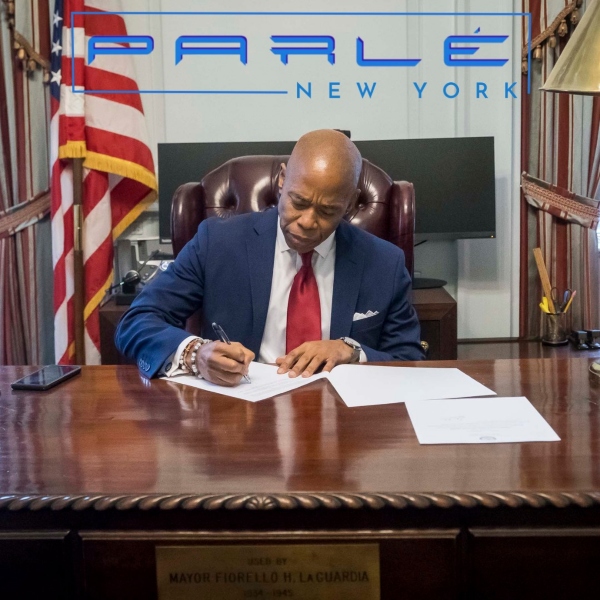 ParleNY: [The mayor recently said that the migrant crisis will ‘destroy New York City’] What do you hope—I know we’re asking for a lot from the federal government, but what do you hope helps calm this crisis down?
ParleNY: [The mayor recently said that the migrant crisis will ‘destroy New York City’] What do you hope—I know we’re asking for a lot from the federal government, but what do you hope helps calm this crisis down?
Mayor Eric Adams: Good question. First, you know I can’t under state how severe this crisis is. We have to go back to the table in our budget in New York City. We are required to balance our budget by law, two years in a row, and we do what’s called a November plan. This is to say, are there any new numbers that we missed in the last plan in June? We’re getting ready to do that, and the migrant asylum seeker crises, we spent $2 billion already. We’re projected to spend another $3 billion. That’s a total of $5 billion of money we did not have.
[Adams has previously said the asylum seeker crisis is costing the city about $383 per family per night. With 57,000 asylum seekers and counting in the system, that’s $3.6 billion for the year.]
Just think about it, you budget your house to pay your lights, your gas, your rent, food on the table, etcetera. You have house insurance just in case of an emergency, so if the roof caves in—well our roof caved in! And our insurance contract was supposed to be the federal government.
They’re telling us they’re not going to pay for it, so it has to come from somewhere! And what it’s going to do, it’s going to come from those resources. The money we put in Fair Futures for foster care children may be on the cutting block. The money we put in our after school programs, senior care, going after children in temporary housing… All of those issues from Cleaning Our Streets, to making sure that we have enough police officers on the beat. Everything is on the on a chopping block!
Every agency is going to have to do a 5% efficiency find and then another 5%. They’re going to have to do a 5% find three times in a row, before we get to the next budget around May and June. Brother, this is going hurt a lot! I cannot emphasize that this is a $12 billion piece of our budget. Many people know that we have $106 billion budget, but $76 billion of that is fixed cost, we can’t touch. So we’re cutting $30 billion of that if we don’t get help from the federal government, and out of that $12 billion federal government is only stating that they’re giving us $100 million out of $12 billion. This is not even acceptable, and it’s going to hurt, and it’s going to hurt a lot.
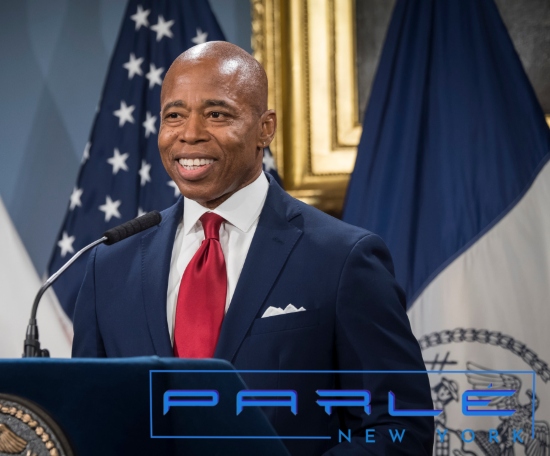
ParleNY: I don’t want to stick on this too long, I have to ask, is there anything you wish you did in the beginning of the migrant crisis? Anything that might have changed course.
Mayor Eric Adams: You know what? That’s such a good question. We just met with the Congressional delegation from the Hispanic Congressional Delegation, and we brought them in and showed them what we’re doing at the encampments, at the places where we are training them up, and we’re signing people up so they can get temporary work status. We walked them through the whole process. They said, ‘we can’t believe this. All that we’re hearing, from people criticizing, saying what y’all aren’t doing.’ They said, ‘this is the most professional, well thought out, dignified operation that we’ve ever witnessed in all of the cities we’ve ever visited.’
And so, when you look at the fact, each one of these bullets:
#1 I have no authority to deny people access to the city.
A lot of people think we do, that we can just say you can’t come in. That’s a federal authority. It’s against the law for me to do that. I have no authority to send people back to where they came from. Only the federal government can do that. And many people say, well Eric, why don’t you just send people back to those municipalities; I don’t have the right to do that because of what we have here as the Right To Shelter Law, that we are questioning. But at this time, the law does not allow me to do that. The law states, and think about this for a moment, Kevin…
The law states that someone can come here from anywhere on the globe, come to New York City, and stay for as long as they want, and we have to pay for their food, shelter, healthcare, cleaning, take care of their children. Everything! That’s just not sustainable. And it’s not even logical. So now we’re getting people from Russian speaking countries, from Ukraine, from Central America, South America, from Venezuela, Ecuador, Honduras, from all the West Coast of Africa countries, are now coming through the Southern border, and you’re seeing everyone believe in, hey, you could come to New York City and the cost of you living is on the backs of New York City taxpayers. That’s wrong for the migrants who go through that, and it’s darn sure wrong for everyday New Yorkers to see their services cut because of that.
[Mayor Adams has been challenging the Right to Shelter law in court since earlier this year. City Hall politicians however have not been as keen to the idea of completely ending the law because it could lead to a huge increase in homelessness and people living in the streets and on the trains. A judge recently ruled that the law did not apply to migrants, but it’s still going through the courts.]
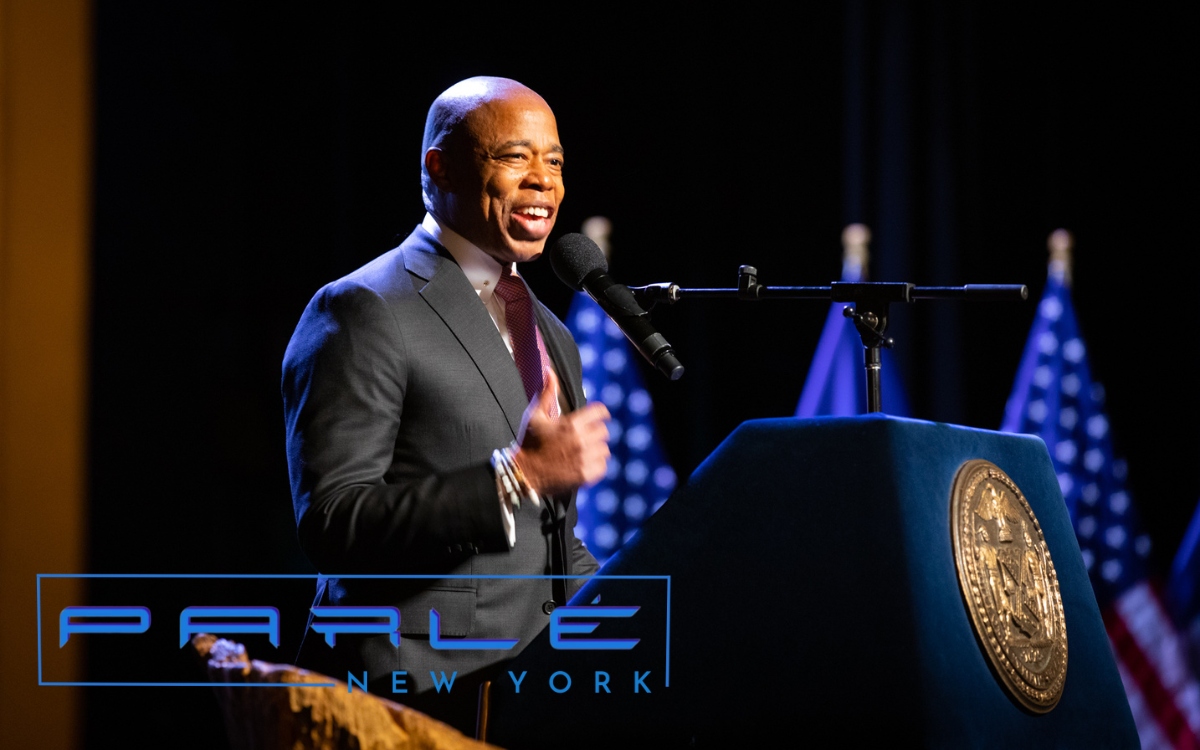
ParleNY: OK, switching gears a bit here, I have to talk about the initiative you recently created, the scholarship fund for students who are going into journalism careers. Just talk to me about why you want to do that and what that looks like.
Mayor Eric Adams: Man, this is so important. You know, it’s like you got to build out a farm team, and you know you have to build out a farm team. I’m doing these press conferences and I’m looking at who’s covering me. And then I pick up the stories and I read them… I said, ‘Were we at the same press conference?!’ You know?! And so, if you don’t have a mixture of people who are reporting the news and covering it, and some people do a good job and they can sit in the room and cover the news, but there’s others who have real slants to it.
You know my son said to me—one day we was reading a story that somebody covered, was clearly wasn’t what I said! And he said (Adams’ son) , ‘You know what, dad? I see you read these stories sometimes and you’re frustrated.’
He says, ‘If the far, far left, the Socialists, own restaurants and car dealerships, and are writers and [write] books, don’t you think some of them are reporters?’
He says, ‘So no matter what you do, they’re pushing their agenda.’ We bring our agenda into what we do. And so it’s not like— It’s one thing to be a columnist, where you write based on opinion. It’s another thing to be a reporter, where you’re supposed to report the facts. I just think we no longer have integrity in journalism because a lot of people have brought their own opinions, and feelings. If you are someone that enjoys bike lanes, if I’m not doing something that you like in bike lanes, you’re going to bring all of that anger into the story. I see a lot of anger in stories.
So what do you do? Build out a pipeline of diversity. Black and Brown people going into journalism, getting those scholarships. People from all over the city, we have to diversify our News Corp. Who’s reporting on our people!
ParleNY: It’s Hip-Hop’s 50th anniversary this year of course. You gave Puff Daddy the key to the city. Just talk to me about why you wanted to give it to Puff.
Mayor Eric Adams: You know for a number of reasons. You know, I didn’t realize how much that meant to him. You know, it really meant a lot to him and I understood why it meant a lot to him. You know, it’s tough being a Brother man. (laughs) You know what I’m saying? You know, and people catch hell in general. So, I don’t want people to misconstrue it, but Black men catch hell all over the globe, man, no matter where you go. Everybody says…–what’s my brother’s name, the comedian… Chris Rock—’Well, at least I’m not a black guy!’
When you look at a P. Diddy, Puff, Puffy, Sean Combs, whatever name you want to give him. When you look at a person who has hit some bumps in the road, I remember what happened up in Harlem. Anyone else would have just laid down and said, you know what the show is over for me. But when you look at this brother constantly reinventing himself, taking painful moments, the incident in the shooting, you know when he was with J.Lo, you know. You look at these constant moments that anyone else would have given up. Instead of doing that, he says: You know what? I’m going to stay true to my purpose. And he said to me, ‘God is good. Eric, God is good.’
It meant a lot for me to do this for a brother. Because I’m so perfectly imperfect, man, I’m just, like, you know, I’m this cat that is not supposed to be here. And he was a brother that’s not supposed to be here. I mean, how do you grow up in South Jamaica, Queens, being dyslexic, fall on the wrong side of the law. I got arrested. You know, I like to say dyslexic, arrested, rejected, and now I’m elected to be the mayor of the most powerful City on the globe! So you tell me God is not good! And that’s what he felt when he stood up at Times Square. And giving him that key to tell him: Brother, all those brothers who think that they cannot make it because they either fit the description or the characteristics that others wanted. You are now standing in Times Square, the center of the universe and the most important city on the globe. And you’ve been acknowledged. That you have the key to the baddest city on the globe, that means a lot, man! So you had Bad Boy’s producer hanging out with the Bad Boy mayor! (Laughs)
ParleNY: I love it!. I know you had the events in the Summer for Hip-Hop’s 50th. Do you have any other plans for events for the year?
Mayor Eric Adams: Yeah, we got a lot of stuff lined up. We have a website lined up on all the stuff we’re doing. Hip-Hop means so much to me. In my most dark moments I was able to, you know, throw on a Hip-Hop tune and it just was my motivator. If I’m in the gym, if I’m studying for an exam, if I’m running for office, you know, when all else has beat me up, man, I just throw on, you know, just throw on some Hip-Hop. And so now I’m the first Hip-Hop mayor, during the time we’re celebrating 50 years of Hip-Hop. It means a lot. And we want to continue to have young people lean into those pioneers and see the business aspect of it. The first aspect of Hip-Hop was being on stage. Now we want people to learn the business aspect of it, how to be the producers, the distributors. What does AI look like in the industry? What does streaming look like? There’s a whole new conversation and we want to use this time to really educate our brothers and sisters about the role of Hip-Hop, and what it means.
ParleNY: I appreciate that, appreciate the conversation. This was great.
Mayor Eric Adams: Yes, thank you. Thank you so much. Good luck to you.
We only were able to sit with the mayor for 20 minutes, so we were limited in what we were able to talk about. But hopefully this was just the first of many conversations. Hope you enjoyed our Mayor Eric Adams interview.
Image Credits: NYC Office of the Mayor

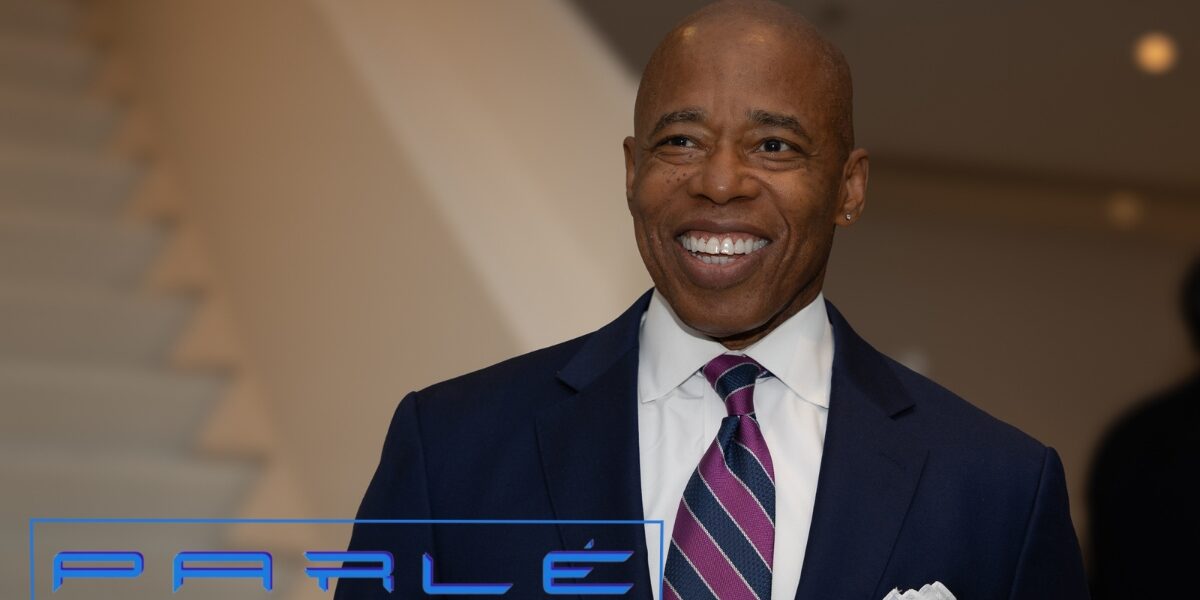
Pingback: American Museum of Natural History To Open New Hip-Hop Exhibit